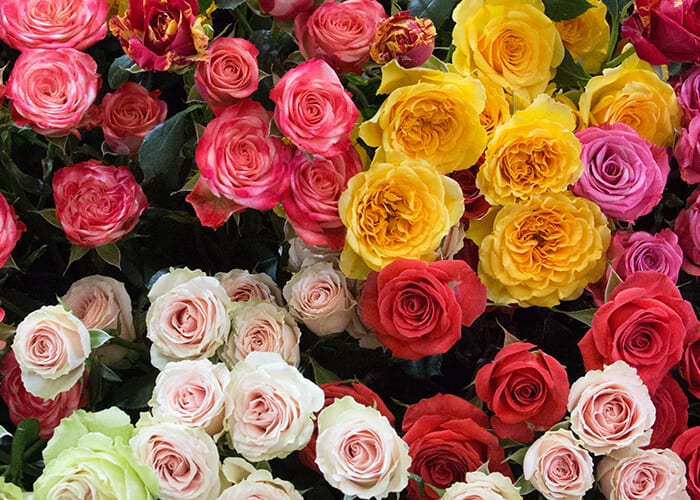All purchasers are motivated by how they feel and what surrounds them, from generational values to social media experiences and consumer personas. These days, consumers are embracing life and design in simpler form and putting a high value on self-awareness and overall well-being for themselves and the environment. And at the end of the day, plants and flowers make us feel better and connect us to the world around us.

“Understanding the factors that influence the buying decisions of four generations of consumers will help you develop successful marketing strategies for all.”
So, how can floral breeders, growers, wholesale suppliers and retailers use this information to inform marketing and merchandising? Consider taking a deeper dive into Produce Marketing Association (PMA) research and resources on consumer trends, personas and purchasing drivers. We’ve covered some highlights here.
Generational Selling? Yes and No.
According to a 2016 Russell Research report, boomers, Gen X and millennials (Gen Y) all rated personal appreciation of flowers about the same: 72 percent, 73 percent and 76 percent, respectively, of those surveyed said they strongly appreciated flowers.
Generation Z (post-millennials) is the fourth generation now entering the workforce. Gen Z will also be the largest consumer group by 2020, making up 40 percent of consumers in the United States, according to a FastCo study. There is always danger in generalizing about a generation; however, for the sake of argument, here goes.
Growing up with the internet and smartphones, Gen Z values convenience and expects the customer experience to be front and center, according to Forbes. Research tells us Gen Z also tends to be frugal and selective in where they spend their money. Gen Z also tend to be multitaskers with short attention spans. And, they are not prone to purchase from brick-and-mortar. To reach this generation, plan to be on multiple digital channels, and give the audience your full story in eight seconds or less.
The idea of aging is changing; however, according to Mintel and Euromonitor International, baby boomers have much more in common with the values and priorities of millennials and Gen Z than you might think. Whether creating experiences for millennials or helping baby boomers have more life balance, marketing to consumers is about flexibility and being age agnostic.
Baby boomers are just as obsessed with technology, the latest apps and smart devices, but they are in better financial shape than the rest of the population. They boast the highest spending power among all age groups and want to enjoy their lives without worry about the future. This is a prime opportunity for the floral industry to sell premium products to a generation who are affluent, feel young and want to enjoy each day.
Purchasing behavior is also driven by customer personas as well as generational, social and cultural influences. Personas identified by GC Metrics researchers for PMA include the holiday purchaser, gift-for-adult purchasers, everyday purchasers and reluctant shoppers. Functional and emotional drivers vary by persona. PMA began exploring consumer demand using personas at “Fresh Connections: Miami” in May. For more information about personas and drivers and 2019 consumer trends impacting the floral industry, visit pma.com/topics/floral.
Impact of Social Responsibility and Sustainability
Consumers seeking well-being and a deeper meaning in life are embracing life and design in a simpler form. According to Euromonitor International, this spiritual awakening is encouraging consumers to make positive decisions about what they buy in order to reverse the negative impact they perceive consumerism is having on the world.
Many retailers are responding to this trend by embracing the circular economy to minimize waste. Mintel and Euromonitor International both identified the consumer quest to reduce plastics as a trend that will gain momentum in 2019 and beyond. Consumers are demanding the responsible use of plastics by embracing durability, reuse, repurposing and recycling while also seeking alternatives. This philosophy is creating loyal, educated and affluent customers who reward environmental leadership.
This is an opportunistic time for the floral industry to join forces with consumers to better the world through stories of social responsibility. It is also an opportunity to provide premium floral products to an affluent consumer base that responds well to cultural storytelling, authenticity and craftsmanship.
The idea of craftsmanship is valued by consumers who are looking for simplistic, back-to-basic and high-quality products that imply a level of status, according to Euromonitor International. Consumers are embracing hyperlocal and handmade products and are re-evaluating their spending habits, moving away from materialism to simplicity, authenticity and individuality.
Creating Engagement and Community
The idea behind social marketing is to make the consumer part of your community and to create a personal experience with your products instead of focusing on transactions. Social media also positions consumers as experts about the products they want to purchase – another take on the DIY trend.
Consumers can access information and recommendations for products anytime. They share product research, offer discount codes and swap secret deals and helpful hints to find new products at low prices. This is creating pressure on the floral industry to constantly innovate, control prices and streamline offerings.
The floral industry can shift from creating awareness to exerting influence. Consider building digital communities around the effects floral products have on mental wellness. Options include inviting consumers in, using social platforms, and encouraging them to engage with each other and floral experts.
These are just some insights to get you thinking for 2020 and beyond. PMA will explore more topics online; in our own digital community on Facebook for PMA members called “Focus on Floral”; and at Fresh Summit, Oct. 17-19, in Anaheim, Calif. Join the conversation. We’re better together!


Becky Roberts is director of Floral & New Initiatives at Produce Marketing Association (PMA). For more information about PMA membership, floral events, or the work of the Floral Council and PMA’s Floral Transportation Task Force, contact her via email at broberts@pma.com.







